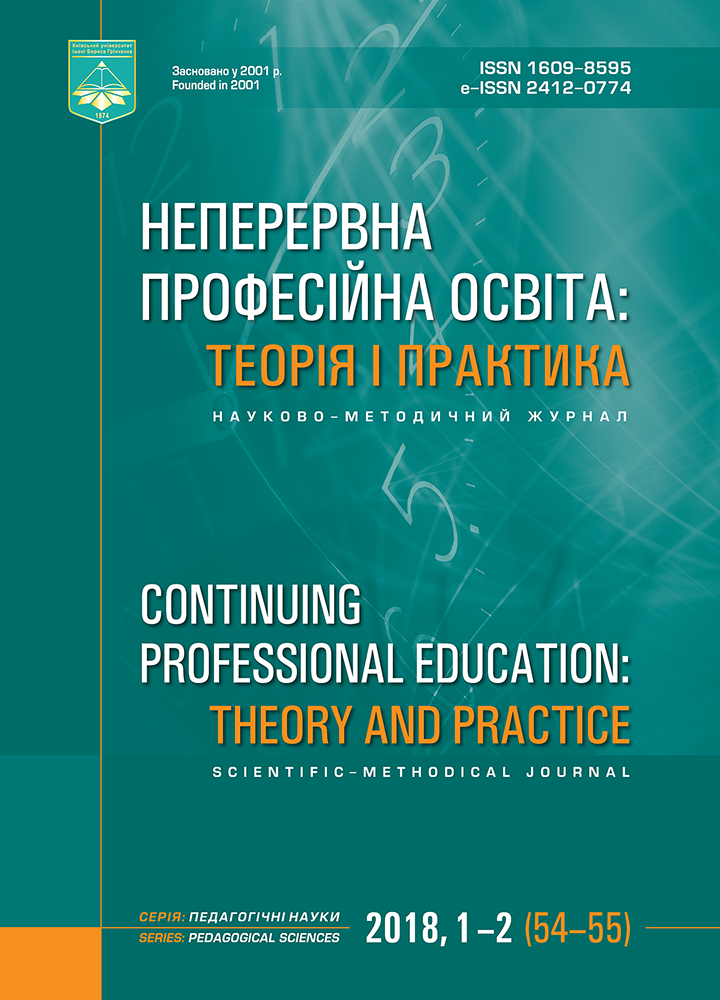TERMS ANALYSIS REFERRING TO THE PROFESSIONAL COMMUNICATION TRAINING OF FUTURE PHYSICIANS
DOI:
https://doi.org/10.28925/1609-8595.2018(1-2)5258Keywords:
higher medical education institution, communicative competence, communication skills, future physician, terminological system, professional communication.Abstract
The article presents the main findings of carried out terminological analysis of the professional communication training in undergraduate medical education and describes developmental factors influ-encing the communication skills development with the aim of further accounting received results in the process of modernizing subjects directed at the formation of professional qualities and communicative competence of medical students. The definition of the terms referring to the medical communication training enabled us to determine professional communication of future physicians that develops under the influence of linguistic, psychological, educational and professional factors. The communication readiness includes the development of professional and communication competencies which are realized in the current system of higher medical education by the staged professional undergraduate training and subjects aimed at gaining clinical, linguistic, social and cultural skills. Thus, communicative competence involves the development of lexical and grammatical competencies in both Ukrainian and foreign languages as well as the formation of ethical values in order to provide effective monologues, dialogues and polylogues during the interpersonal and intrapersonal interaction in colloquial, official, business, academic and teaching speaking styles. Modern pedagogical approaches to the professional communication training and global academic processes necessitate the application of information and communication technologies in the educational process physicians and their further carrier. The subjects directed at the development of communicative competencies of medical students should encompass theoretical and practical aspects of professional clinical thinking and proper language skills; acquiring clinical skills; development of social and professionally important qualities and values; learning the key aspects of professional activity with the aim to force the readiness for professional communication by means of professional language in the determined forms of communication.References
Aharkova, А. О. (2010). Deiaki aspekty formuvannia profesiino-etychnoi kultury likaria [Some developmental aspects of the professional and ethical culture of physicians]. Visnyk Luhanskoho natsionalnoho universytetu imeni Tarasa Shevchenka. Pedahohika, 7 (194), 10–14 (ukr).
Vyskushenko, S. A. (2013). Fakhova mova yak obiekt linhvistychnoho doslidzhennia [Professional language as the object of linguistical research]. Naukovyi blog NaU «Ostrozka Akademiia». Retrieved from: http://lingvj.oa.edu.ua/articles/2015/n58/55.pdf/ (ukr).
Kremen, H., Nikilaienko, S. (Eds.) (2005). Vyshcha osvita v Ukraini: navchalny posibnyk [Higher Education in Ukraine: coursebook]. Kyiv, Ukraine: Znannia (ukr).
Humenna, I. R. (2015). Osoblyvosti pidhotovky maibutnikh likariv do profesiinoi komunikatsii [The Peculiarities of Professional Communication Training of the Future Physicians]. Naukovyi visnyk MNU imeni V. O. Sukhomlynskoho. Pedahohichni nauky, 1 (48), 100–104 (ukr).
Zakon Ukrayiny «Про освіту» [Law of Ukraine «On Education»]. Retrieved from http://zakon2.rada.gov.ua/laws/show/1556-18 (ukr).
Zeer, Ye. F., Pavlova, A. M., Symaniuk, E. E. (2005). Modernyzatsyia professyonalnoho obrazovanyia: kompetentnostnyi podkhod: uchebnoe posobye [Modernisation of the professional training: competence approach: coursebook]. Moscow, Russia: Moskovskyi psykholoho-sotsyalnyi institut (rus).
Maniuk, L. (2016). Tekhnolohiia vrakhuvannia linhvistychnykh osoblyvostei fakhovoi komunikatsii maibutnikh likariv [The technologies of accounting linguistic peculiarities of professional communication of future physicians]. Pedahohichnyi protses: teoriia i praktyka, 4 (55), 119–124 (ukr).
Mishchenko, A. L. (2013). Linhvistyka fakhovykh mov ta suchasna model naukovo-tekhnichnoho perekladu [The linguistics of professional languages and modern model of scientifical and technical translation]. Vinnytsia, Ukraine: Nova Knyha (ukr).
Poplavska, S. D. (2009). Formuvannia hotovnosti studentiv medychnykh koledzhiv do komunikatyvnoi vzaiemodii u profesiinii diialnosti: avtoref dys. na zdobuttia nauk. stupenia kand. ped. nauk [Preparing the students of medical colleges to the communicative interaction in the process of their professional activity]. Extended abstract of the candidate’s thesis 13.00.04. Zhytomyr, Ukraine (ukr).
Shumskyi, O. L. (2013). Profesiina komunikatsiia pravookhorontsiv u konteksti mizhkulturnoi vzaiemodii [Professional communication of lawyers in the context of intercultural interaction ]. Visnyk Natsionalnoi akademii Derzhavnoi prykordonnoi sluzhby Ukrainy. Retrieved from http://nbuv.gov.ua/UJRN/Vnadps_2013_2_18 (ukr).
Yukalo, V. Ia. (2003). Movni stereotypy v komunikatsiiakh likaria [Linguistic stereotypes in the communication of a physician]. Extended abstract of the candidate’s thesis 10.02.01. Kyiv, Ukraine (ukr).
Yusef, Iu. V. (2013). Osoblyvosti formuvannia komunikatyvnoi kultury maibutnikh likariv u suchasnomu sotsiokulturnomu seredovyshchi [The developmental peculiarities of future physicians’ communication culture in modern social and cultural environments]. Visnyk Luhanskoho natsionalnoho universytetu imeni Tarasa Shevchenka. Pedahohichni nauky, 21, 145–150 (ukr).
Dickson, D., Hargie, O., Morrow, N. (1997). Communication Skills Training for Health professionals. London, Great Britain: Nelson Thornes Ltd (eng).
Hojat, M. (2009).Ten approaches for enhancing empathy in health and human services culture. Journal of Health and Human Services Administration, 31, 412–450 (eng).
Spietzberg, B. H. (1980). Progress and Pitfalls in Conceptualizing and Researching Intercultural Communication Competence. Speech Communication Association. New Orleans, USA, 209–226 (eng).
Downloads
How to Cite
Issue
Section
License
Copyright (c) 2020 Lyubov Manyuk, Nataliya Kuchumova

This work is licensed under a Creative Commons Attribution-NonCommercial 3.0 Unported License.



